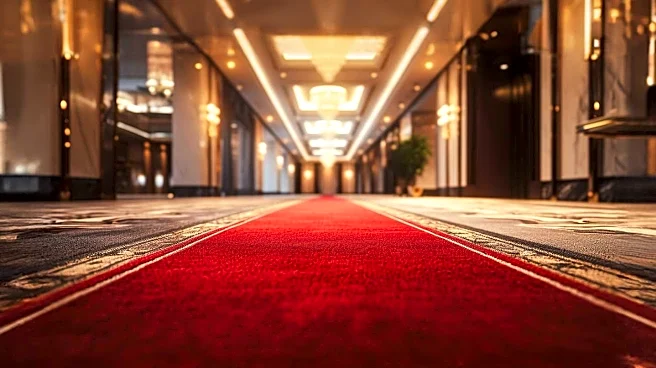What's Happening?
The event industry is witnessing a significant shift towards 'quiet luxury,' a trend characterized by understated elegance and authenticity. This movement marks a departure from the traditional emphasis on opulence and spectacle, focusing instead on experiences
defined by intention, restraint, and sustainability. Experiential creators are observing a growing demand for events that prioritize emotional resonance and craftsmanship over grandiosity. This change is driven by a cultural and economic shift where extravagance is increasingly seen as tone-deaf, and affluent consumers are opting for subtlety and meaning in their luxury experiences. The concept of 'luxury shame' is influencing this trend, as consumers seek to temper overt displays of wealth. Additionally, sustainability has become a crucial consideration, with clients favoring locally sourced and ethically made products that align with the principles of quiet luxury.
Why It's Important?
The shift towards quiet luxury in the event industry reflects broader societal changes in consumer behavior and values. As consumers become more environmentally conscious and socially aware, there is a growing expectation for brands to demonstrate responsibility and authenticity. This trend has significant implications for the luxury market, as it challenges traditional notions of status and prestige. Brands that successfully adapt to this new paradigm stand to gain a competitive edge by appealing to a more discerning and conscientious audience. The emphasis on sustainability and craftsmanship also aligns with the increasing demand for experiences that offer genuine emotional connections and lasting memories. This evolution in consumer preferences could lead to a reevaluation of marketing strategies across various sectors, encouraging a focus on quality and meaning over quantity and spectacle.
What's Next?
As the trend of quiet luxury continues to gain traction, event creators and brands are likely to explore new ways to incorporate these principles into their offerings. This may involve a greater emphasis on personalized and immersive experiences that resonate on an emotional level. Companies may also invest in sustainable practices and materials to meet the growing demand for environmentally friendly options. The shift towards subtlety and authenticity could influence other industries, prompting a broader cultural movement towards more meaningful and intentional consumption. Stakeholders in the luxury market will need to adapt to these changes to remain relevant and competitive in an evolving landscape.
Beyond the Headlines
The rise of quiet luxury highlights a potential cultural shift towards valuing experiences over material possessions. This trend may encourage a reevaluation of what constitutes luxury and success, moving away from conspicuous consumption towards a more nuanced understanding of value. The focus on sustainability and craftsmanship could also drive innovation in product design and event planning, fostering a new era of creativity and collaboration. As consumers increasingly seek out experiences that align with their values, brands that prioritize authenticity and ethical practices may find new opportunities for growth and differentiation.















